By Sean Fagan
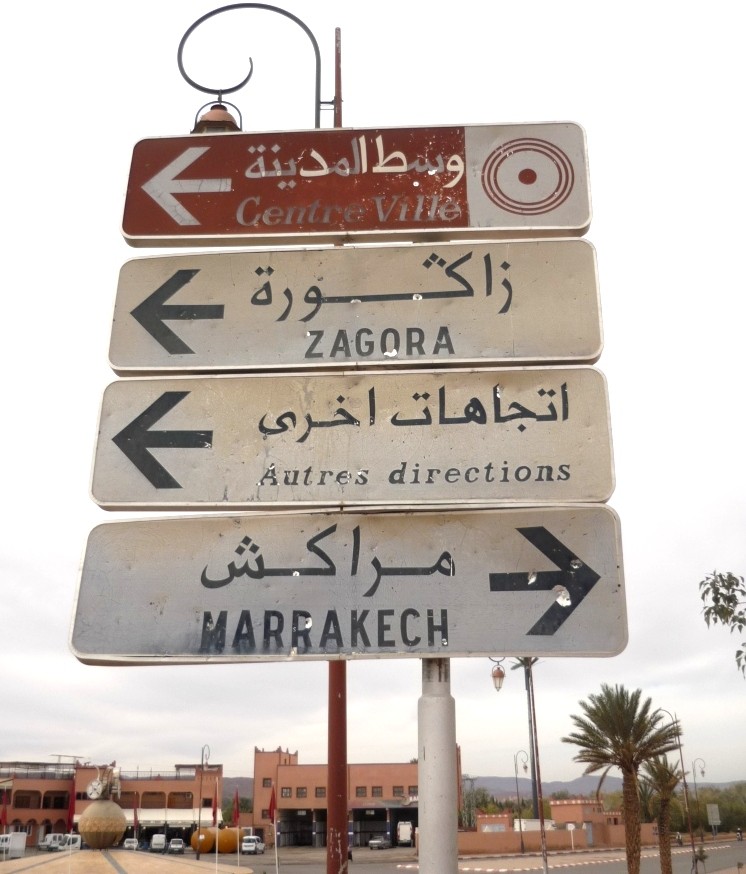
Where to now? (Photo: Sean Fagan, Morocco)
.
Happy new year folks – I sincerely hope my blogs will motivate you to seek your own, quirky, fun-filled and challenging adventures in 2019. Get out there and have some fun.
.
Expecting the Unexpected when on an Adventure
.
The best and worst adventures I’ve ever had were muddled with unpredictably.
It’s not like I don’t do my research before a trip (I partly do this because of a fear of the unknown…ironic).
But there is a catch with researching a lot – it can put you off going on an adventure in the first place.
I strongly believe a huge part of what makes an adventure really enjoyable is surrendering to the unknown...
.
Dogs, Camping and the Berber People
An example of Unpredictability
.
So there I was asleep in an Moroccan desert.
Suddenly - the quiet night exploded into noise! It was about 1am. The noise grew and grew. It was near – about 100 metres away…
Two rival dog packs decided to have it out.
They really went for it…you could sense the ferocity, the ill-intent.
These weren’t small dogs either - these were good-sized, well-built dogs.
Somewhat feral and fiercely territorial, these dogs were out to kill.
.
This fight lasted two hours – from 1am to about 3am.
Two full hours of unremitting, all-out aggression with no let up. It was unreal. I’m guessing there were about 10-15 dogs altogether – split between two well-matched packs.
The constant, full-throated barking was only punctuated by loud yelping when one of the dogs was viciously bitten. You could sense other dogs lunging in to attack the bitten dog but were quickly deterred by allies of the bitten dog.
It was an intense, close battle, it had to be – it went on for so long.
And it was damn scary. I didn’t budge in my sleeping bag, as dogs can hear the faintest sound.
.
Where did the dogs come from?
.
Being so close to such unrestrained ferocity that could potentially turn on you is scary.
But here is the thing, I did a fair amount of research about Morocco before going there.
I read a lot about the fascinating Berber culture that is indigenous to the region where I was camping.
So off I went camping not too far away from a Berber town that was situated in the desert. Like most desert towns – its very existence is based on the availability of water, meaning the town is perched beside a river or lake or both.
The basic layout of Berber towns in Morocco is as follows: there is the town and surrounding the town is lush farmland. The farmland is irrigated by the main river that runs on the outskirts of the town. Beyond the farmland is a great expanse of desert, as far as the eye can see.
The Berbers are fantastic farmers. They can grow so much by carefully channelling off river water through a network of small, irrigation canals that vein out over the land that is adjacent to the river.
But here is one of the catches.
The farmers are poor.
So they work hard throughout the day, then go home at night.
So what do they do to stop theft of their crops at night? They allow dogs to roam on their land. Their presence deters any nocturnal crop thieves (Wild and domestic animals, as well as humans).
.
But these dogs are semi-wild. The owners leave out food for them but that’s about it. They roam without restraint.
During the day they generally avoid humans.
But at soon as the sun sets they come into their own. Night time is clearly their domain.
.
So there I was camped in the desert but not far from agricultural land.
Like the farmers - I too was dependent on the nearby river (to keep hydrated and provide cooking water – an eternal concern in a desert).
The only problem was the dogs.
I mean there were snakes to consider – but it was winter - and I suspect the chilly nights and cool mornings and late afternoons had generally rendered them inactive.
The only reptiles I saw were tiny lizards.
.
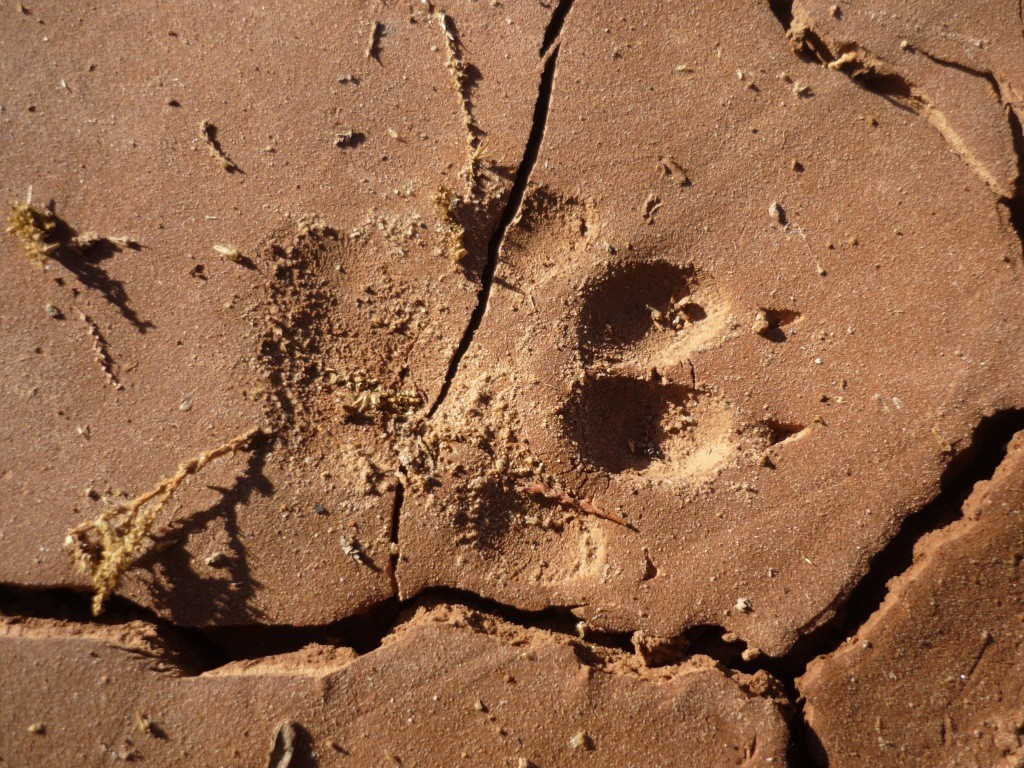
One of the many dog tracks near my camp the morning after their full-blooded fight. It's not exactly comforting awakening to so many large dog tracks so near to where I slept (Photo: Sean Fagan).
.
Unsurprisingly, I barely slept during the night of the fight.
But in the morning the dogs were gone. As a treat I hiked into town and had a nice breakfast.
After breakfast I went for hike into the desert.
The sun was out, splitting the rocks.
I had a great day.
Then I did something seemingly irrational that night.
I went to bed.
And slept like a log.
Something told me the dog fight was a rare occurrence and would not happen again for a while.
.
I know, I know…”why didn’t you move camp?”
Dogs were not uncommon. I vividly remember a long hike into the desert – to a lake. I spotted something in the far distance. I took out my binoculars. Languishing on the lake shore were three dogs, just hanging out. It was actually funny. They looked so content.
.
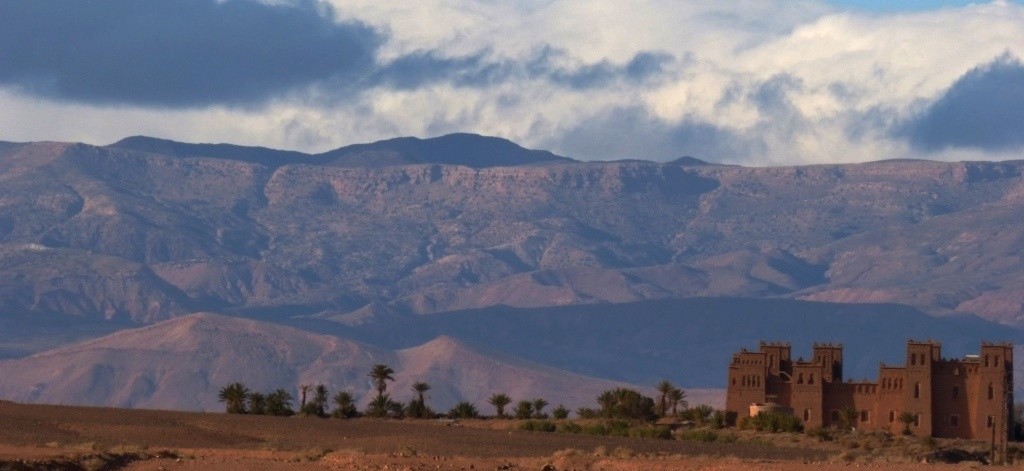
I was often awestruck by the vast beauty of the high desert - but it’s an uncompromising place. Out there, carelessness can be punished and often punished hard. Obviously, it’s an incredibly dry place with hardly any water but there is also the stifling heat, burning sun and cold nights to deal with. It’s also easy to get lost, especially on the mostly featureless plateaus. But if you take precautions, and do things right – the desert is a place of immense charm and intrigue (Photo: Sean Fagan - Berber Fort, Atlas Mountains in background).
.
.
Two weeks passed in my basic, desert camp.
Two amazing weeks in the desert.
There were a few canine skirmishes but nothing that remotely equalled the ferocity of the worst night.
However, I was strict about a few things at camp to deter any inquisitive dogs.
- I never cooked or stored food at camp (I learnt this trick when camping in bear country in Canada). Like bears, dogs often follow their noses when it comes to finding food. Food was double-bagged in plastic bags and suspended in a thorny tree a good distance away from camp.
- I never went to the toilet near my camp. Occasionally, I would have the urge to urinate at night but I always peed into a plastic bottle and dumped my wee far from camp the next morning (excuse my candor).
- I made a big effort to surround my camp with some thorny vegetation. I stuffed any sizable gaps in the shrubbery with thorny vegetation (mostly acacia branches). This made it difficult for any dog to access my camp. I deliberately selected a campsite within a stand of shrubby vegetation to hide myself from the prying eyes of passing people.
- With my carving knife, I carved a long, heavy club from a branch (about 3 foot long). A last means of defense against dogs.
.
My priority was to keep down my scent signature. To minimise any smells that would arouse the curiosity of local dogs. It worked a treat. I never saw any more fresh dog tracks near my camp during the remainder of my stay.
.
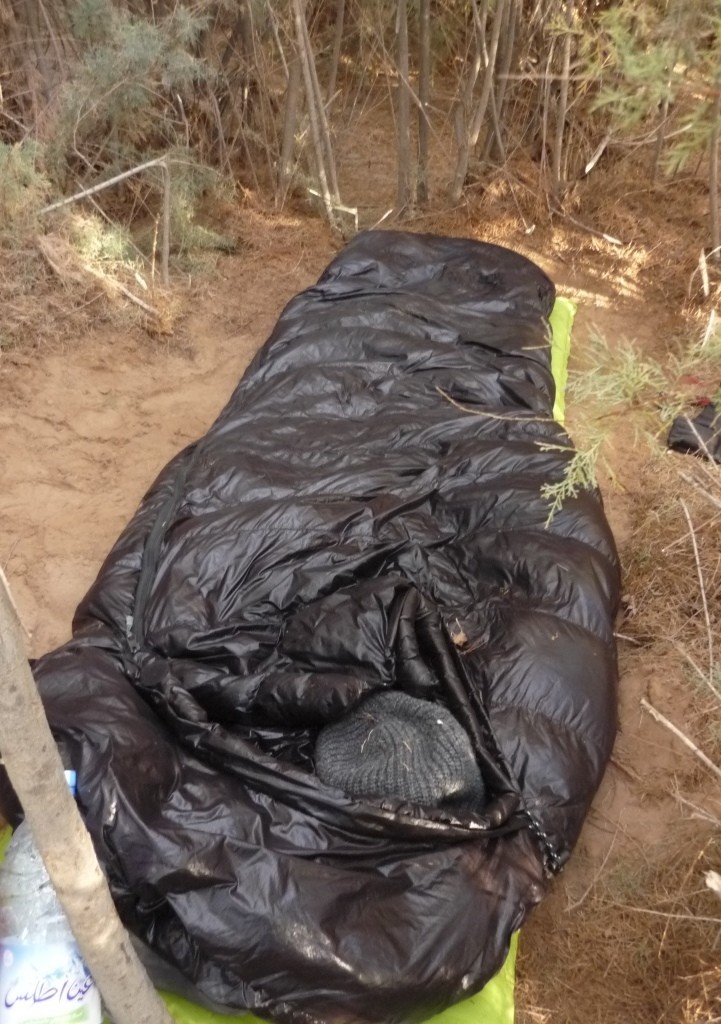
My camp was very basic – a down-filled sleeping bag on an inflatable mat (note wool hat in sleeping bag). I also had a tarp on standby. It’s rare I can sleep out like this - but it’s a great way of connecting to nature. As I laid in bed each night, it was deeply relaxing and inspiring to watch the shimmering stars overhead. Quick Tip: Suspend your sleeping bag during the day to air-dry and minimize the entry of any creepy crawlies (including snakes) into your sleeping bag (Photo: Sean Fagan).
.
Occasionally I did hear some dogs bark in the distance but it was nothing.
I had a sense that the big dog fight was a flare up between two rival packs.
Animals are not dumb. Instinctively they know they cannot sustain such a level of violent aggression against each other (That’s my uneducated guess on the matter).
.
A few basic points from this story:
- Adventure is unpredictable. Research is vital but will not prepare you for everything (often not even close…the poet, Louise MacNeice, summed it up well - ”World is crazier and more of it than we think, incorrigibly plural”).
- Roll with, and expect, challenges (i.e. expect things to go wrong and not according to plan).
- Situational awareness is key - be observant and vigilant and generally aware of your surroundings - and most crucially, trust your intuition.
.
Overcoming fear, rolling with bad situations, trusting your instincts and immersing yourself in your adventure – these are some of the hallmarks of an adventure in my books.
Taking the good with the bad.
Wild places really don’t give a damn about your agenda. They just are. It’s you that has to adapt.
I don’t seek danger. It’s not my thing. But being scared once in a while is often a part of an adventure.
.
I’ll never forget that night, lying in my sleeping bag in the desert - the darkness overhead sprinkled with stars - while two dog packs fought tooth and nail for dominance.
Times like these are ways of connecting to nature - strange as that statement may be.
They are enriching partly because they are very real and unpredictable – and they really test your nerve.
.
I think deep down, most adventurers want to be stretched. Stretched physically, yes. But also emotionally and mentally.
We want to grow in ways we don’t even know how.
.
.
"The immense desert, empty as a bird's wing, inspired him with promise"
Mike Bond
.
.
(P.S. I've included additional desert photos at the end of this article).
.
Related articles on this website:
.
*Check us out on Instagram, Twitter & Facebook for more outdoor-related topics..
In a future blog I’ll explore some simple tips on how to immerse yourself into a new culture and landscape.
You might be surprised.
I'll also offer tips on how to make up your own adventures – adventures that represent your own quirkiness and love of wild places.
.
Finally, some additional photos of the desert I camped in...
.
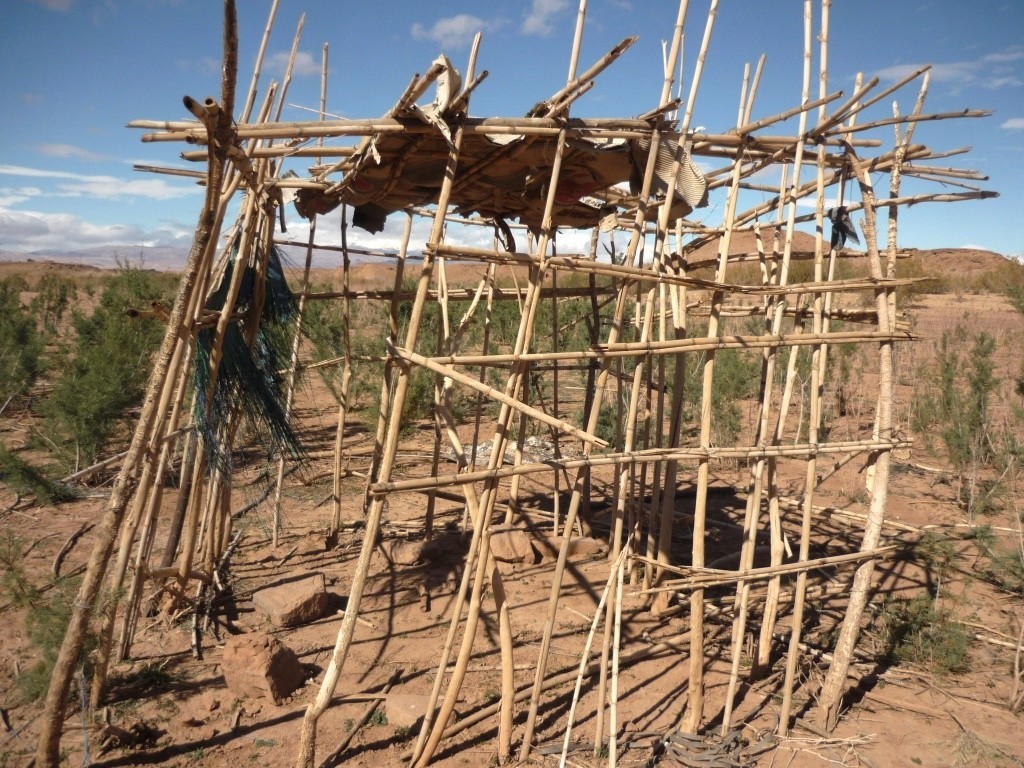
The dilapidated remains of a shelter used by reed collectors. To this day, Berber women, often old, still collect reeds for all sorts of uses…mats, baskets, mattresses, walls and in photo, a makeshift shelter near a reed bed. Undoubtedly, this shelter would have provided the reed collectors some welcome respite from the burning sun (Temperatures often climb above 45 degrees centigrade during summer), (Photo: Sean Fagan).
.
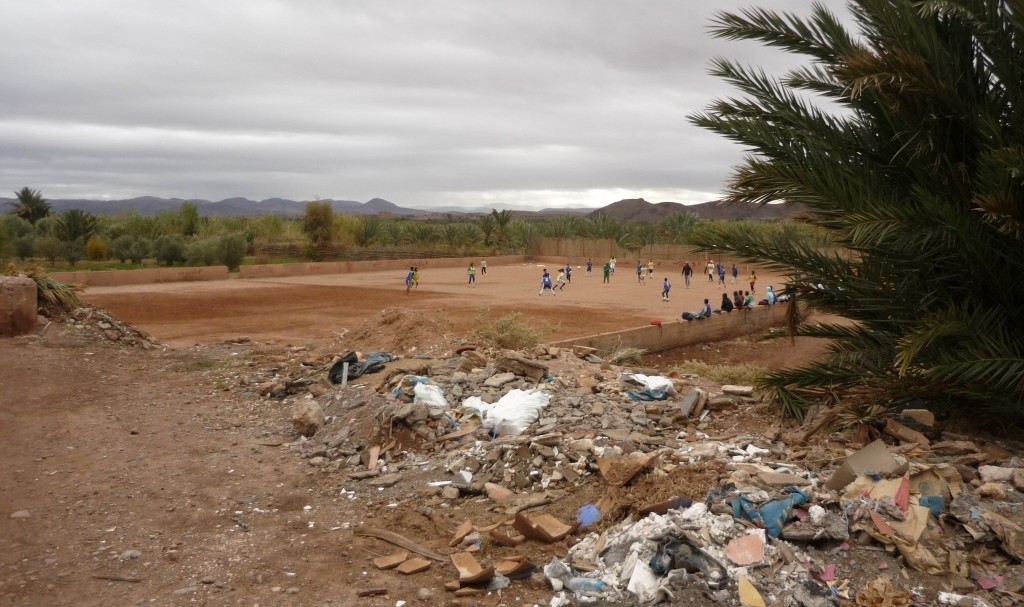
What can be an issue when travelling far afield is coping with cultural differences. In Morocco, soccer is the king of sports. Nearly every bar and restaurant shows soccer on TV. But seeing kids play their hearts out on a dusty, rock-hard pitch - beside a rubbish dump can be hard to take in. Experiencing a lot of poverty first hand is often necessary when travelling to some countries, but it’s never easy (Photo: Sean Fagan).
.
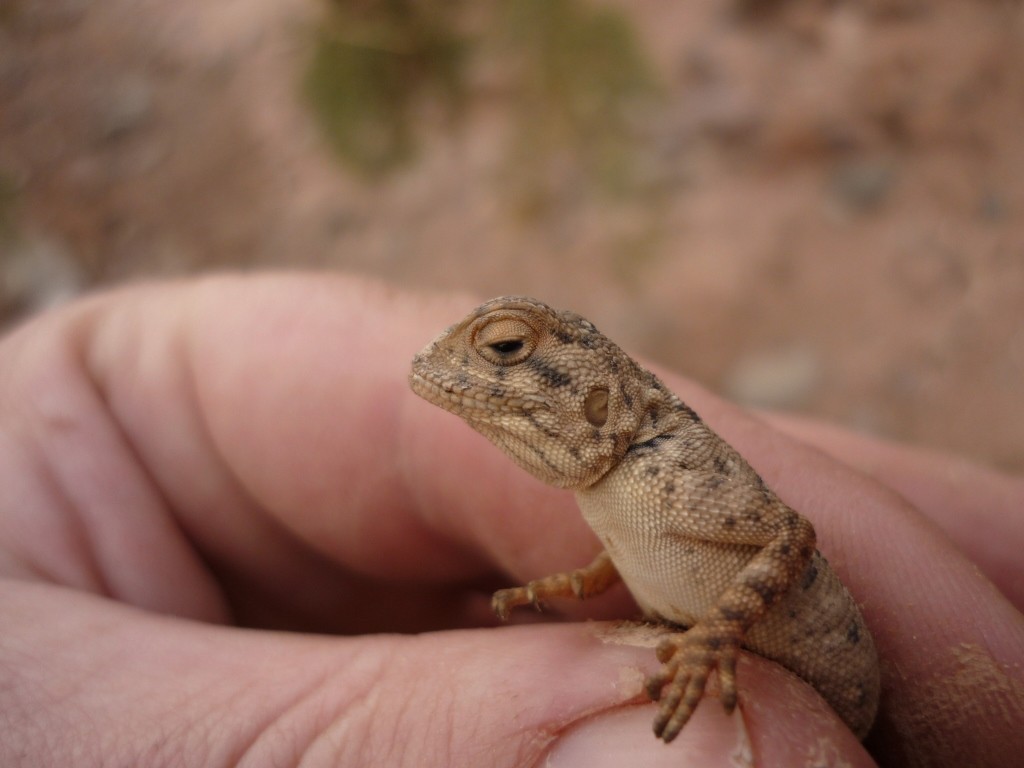
One of the many small lizard species I came across in the desert. I love the desert camouflage of this little lizard (Photo: Sean Fagan).

Recent Comments